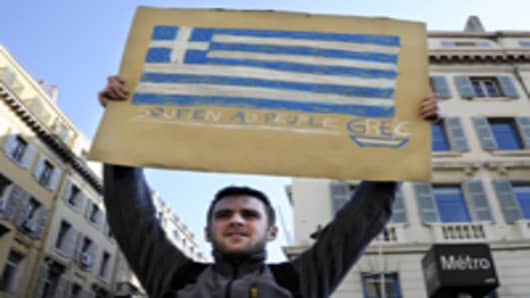Concerns about Greece are returning to the euro zone agenda as the embattled Mediterranean country approaches key negotiations about changing the terms of its bailout by international lenders.
Greece is hoping for a two-year extension on its austerity package, but may have to accept stricter terms as a result. Angel Gurria, Secretary-General of the Organisation for Economic Co-operation and Development (OECD) added his voice to those calling for an extension in an interview with CNBC Tuesday.
French President Francois Hollande and other European leaders are reportedly preparing to warn German Chancellor Angela Merkel that Germany, the main opponent of the extension, may have to accept some form of debt relief.
A conference call of euro zone finance ministers to discuss Greece will take place Wednesday, and an additional Eurogroup meeting has been scheduled for November 8, signaling that negotiations are at a critical stage as the deadline for Greece to run out of money approaches.
(Read More: Confusion Over Greece's Bailout Extension)
"We do not have that much time to discuss this," Ewald Nowotny, head of Austria's central bank and member of the European Central Bank(ECB)'s governing council, warned in an interview with CNBC Tuesday.
There are still plenty who question the wisdom of the bailout itself.
"These bailout loans and the extension to them constitute not help but a poisonous remedy. It's like throwing petrol on the fire instead of water," Yanis Varoufakis, professor of economics at the University of Athens, told CNBC.
"Greece needs to be aided out of its Great Depression, but these loans and extensions are catastrophic not only for Greece but for the donors of that aid."
In recent months, the attitude of Greece's international creditors had appeared to be softening. Worries about the potential for contagion if Greece were to exit the euro zone, which had abated, returned to the agenda as it became increasingly likely that Spain would ask for a bailout.
"Now the anxiety is over a Greek default's precipitating a Spanish default and possibly defaults of other sovereign borrowers also," according to Stephen Lewis, chief economist at Monument Securities.
"The losses that banks would incur in such a process, long before the mechanisms of banking union were in place, would very likely destabilize the euro arrangements and spell the end for the single currency experiment."
However, the troika of the European Commission, ECB and International Monetary Fund has recently refused to make concessions on labor market reforms, which would be a stumbling block for the Democratic Left, one of the parties governing Greece.
Greece may be the worst-affected country in the euro zone, but it is not the only one which has been bailed out, and creditors may not want to grant too many concessions in case others use the excuse to renegotiate more favorable terms.
(Read More: The Cost of Greece's Recovery)
Varoufakis said he was confident that there would be "some fig leaf" to push the reforms through because Greece needed the bailout "like a heroin addict."
"We have a case of deep insolvency. Lending more money to the insolvent Greek state to lend to the insolvent Greek banks makes no sense," he argued.
He believes that Greece's problems should be fixed by recapitalizing the stronger Greek banks directly from bailout funds, rather than from the sovereign bailout, and that there should be a coupling between growth and the rate of repayment of loans. He also argued for the release of at least 12 billion euros ($15.5 billion) in structural investment funds from the European Investment Bank – not the Greek state – for direct investment projects in Greece private sector.
"If Greece exits the euro zone, very soon there will be no euro zone left. The whole house of cards will collapse," Varoufakis warned.
Written by Catherine Boyle, CNBC. Twitter: @cboylecnbc.



